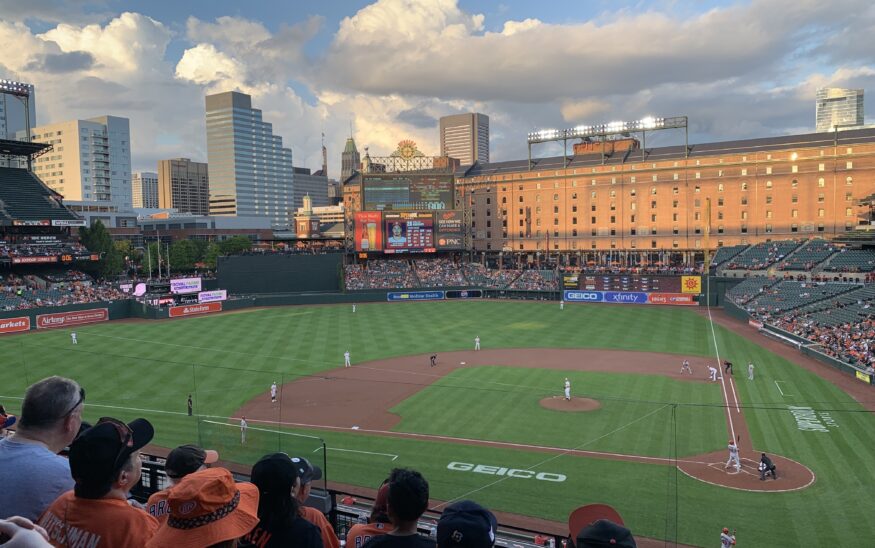Commentary: How Law Practice Is Just Like Baseball
By: WISCONSIN LAW JOURNAL STAFF//March 27, 2024//
Commentary: How Law Practice Is Just Like Baseball
By: WISCONSIN LAW JOURNAL STAFF//March 27, 2024//
Published March 27, 2024 at 10:01 p.m. EDT.
By Paul Fletcher, Executive Director of The Virginia Bar Association
In his 2005 confirmation hearing, U.S. Chief Justice John Roberts famously promised that his job on the Supreme Court would be “to call balls and strikes and not to pitch or bat.”
His baseball analogy was apt: If you look around, you’ll see that the game of baseball and law practice have many similarities.
In honor of Opening Day this week, here are some ways that practicing law is just like baseball:
Rules. Lots of rules. The law has statutes, codes and regulations, covering everything and more. Baseball has the “Official Baseball Rules,” which you can download at mlb.com, all 192 pages of it. Read all about how the diamond is configured, how to score, who’s on first, what’s on second and a host of other in-the-weeds stuff.
Rules with memorable names. Any law student will recognize “The Rule Against Perpetuities” or “The Rule in Shelley’s Case” (even if they can’t explain what the rules say). Baseball has rules that go by their names as well. There is “The Travesty Rule,” in which an umpire can throw out any player who commits a “travesty to the game,” such as running bases backward. And there is “The Infield Fly Rule” (a pop fly ball in the infield with fewer than two outs is an out). The Infield Fly Rule actually was the subject of a University of Pennsylvania law review article in 1975. You can look it up.
Cool lingo. You’ll find colorful terminology in both fields. In baseball, a “can of corn” is a high, easy-to-catch fly ball to the outfield. A “frozen rope” is a hard-hit line drive. And “ducks on the pond” are runners on the bases. In law, a “tortfeasor” is a bad actor, a guy who commits torts. (“Tortfeasor” also would be a good name for an ’80s metal band.) A “pettifogger” is an unethical lawyer who uses dubious means to win cases. And while an “eleemosynary” gift may be charitable, it sounds kind of slimy.
Illegality is bad. Neither baseball nor the law will condone “illegal” acts. The criminal statutes are replete with transgressions that will land you in the Crossbar Hotel. In baseball, the pitcher can be the perp – when he balks. A balk is “an illegal act by the pitcher with a runner or runners on base, entitling all runners to advance one base.” There are in fact 13 different ways a pitcher can balk, all with a common penalty – that free extra base.
Bonus babies. Another commonality: Prized rookies get paid well. Promising big-league prospects may get big contracts, sometimes right out of high school. The top-of-the-class, law-review guys and gals similarly land big bucks. Their annual pay is often north of $150K. Add a few zeroes for the baseball hot-shots, though.
Practice, practice, practice. A ballplayer who makes it to the big leagues presumably has been playing a kid’s game since, well, since he was a kid. That’s years, decades even, spent practicing on clay infields and grassy outfields, working on skills and preparing for The Show. Lawyers “practice” law – days, nights and weekends spent prepping cases and witnesses, working on arguments, strategizing and rehearsing should a case actually make it to trial. One hopes that at some point, all that practice makes perfect.
Pinstripes. You might say “uniforms” are an item in common, but thanks to casual day policies at law firms and a generally relaxed approach to attire following the pandemic, lawyers don’t suit up every day — except when going to court, where wardrobe requirements still are in place. And there you’ll find the nattiest attorneys in pinstripes. As for baseball, nearly half the major league teams at some point have had a pinstriped uniform. The New York Yankees are the most famous for pinstripes, but the Chicago Cubs actually were the first team to sport the stripes, all the way back in 1907.
Losing stupid. In both baseball and the law, you can let the other guy win simply by doing something dumb. Baseball teams can forfeit – per the Official Baseball Rules, many of the forfeits involve not showing up for a game or fielding enough players. In the law, you can suffer a default judgment, a kind of forfeit, also for not showing up for the game: Maybe you should have filed that answer on time.
Who’s in charge? Go back to Chief Justice Roberts on this one. A judge and an umpire both serve a similar function – to oversee the proceeding, enforce the rules and ensure fairness. One wears a black robe, and the other has a mask and a chest protector. You have to wonder, though, how many judges wish they had the ability to toss a showboating, obnoxious litigator with a thumb and a cry of “Yer outta here!”
This article first appeared in the Executive Director’s Notebook, a monthly column written by Paul Fletcher, executive director of The Virginia Bar Association. It was republished by the Wisconsin Law Journal with permission.
Legal News
- Wisconsin attorney loses law license, ordered to pay $16K fine
- Former Wisconsin police officer charged with 5 bestiality felony counts
- Judge reject’s Trump’s bid for a new trial in $83.3 million E. Jean Carroll defamation case
- Dozens of deaths reveal risks of injecting sedatives into people restrained by police
- The Latest: Supreme Court arguments conclude in Trump immunity case
- Net neutrality restored as FCC votes to regulate internet providers
- Wisconsin Attorney General asks Congress to expand reproductive health services
- Attorney General Kaul releases update at three-year anniversary of clergy and faith leader abuse initiative
- State Bar leaders remain deeply divided over special purpose trust
- Former Wisconsin college chancellor fired over porn career is fighting to keep his faculty post
- Pecker says he pledged to be Trump campaign’s ‘eyes and ears’ during 2016 race
- A conservative quest to limit diversity programs gains momentum in states
WLJ People
- Power 30 Personal Injury Attorneys – Russell Nicolet
- Power 30 Personal Injury Attorneys – Benjamin Nicolet
- Power 30 Personal Injury Attorneys – Dustin T. Woehl
- Power 30 Personal Injury Attorneys – Katherine Metzger
- Power 30 Personal Injury Attorneys – Joseph Ryan
- Power 30 Personal Injury Attorneys – James M. Ryan
- Power 30 Personal Injury Attorneys – Dana Wachs
- Power 30 Personal Injury Attorneys – Mark L. Thomsen
- Power 30 Personal Injury Attorneys – Matthew Lein
- Power 30 Personal Injury Attorneys – Jeffrey A. Pitman
- Power 30 Personal Injury Attorneys – William Pemberton
- Power 30 Personal Injury Attorneys – Howard S. Sicula












